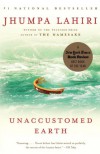1
Followers
22
Following
Infinite Joe
I like challenging books that make you think, and leave you happy that you did. Typically, I find character driven literary fiction the most satisfying, although I in no way think of myself as a serious literary critic.
Brief Interviews with Hideous Men
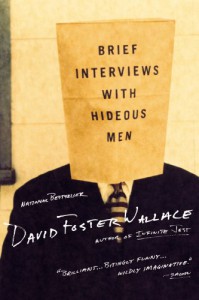 There are a lot of good reviews about this book, and the reviewers can all do a better job than me in going into the specifics. I will agree that although this book is really good (with the exception of "Tri-Stan: I Sold Sissee Nar to Ecko"), it isn't DFW's best. I don't agree, though, with those who think he is arrogant and egotistical. I think he was just an extremely intelligent person that wanted to share whatever was in his head, both for the reader, and for himself as a kind of catharsis. His writings cover all aspects of being human. Psychology, philosophy, depression, addiction, boredom, human interaction (many times the awkwardness of or lack of), shameless honest introspection, &c. And he does it all with amazing prose, varying literary techniques, and a sense of openness. Sure, it's challenging to read. But if you're willing to engage, the payoff is worth it.
There are a lot of good reviews about this book, and the reviewers can all do a better job than me in going into the specifics. I will agree that although this book is really good (with the exception of "Tri-Stan: I Sold Sissee Nar to Ecko"), it isn't DFW's best. I don't agree, though, with those who think he is arrogant and egotistical. I think he was just an extremely intelligent person that wanted to share whatever was in his head, both for the reader, and for himself as a kind of catharsis. His writings cover all aspects of being human. Psychology, philosophy, depression, addiction, boredom, human interaction (many times the awkwardness of or lack of), shameless honest introspection, &c. And he does it all with amazing prose, varying literary techniques, and a sense of openness. Sure, it's challenging to read. But if you're willing to engage, the payoff is worth it.
Olive Kitteridge: Fiction
 Usually, for a book of short stories, I rate each one individually, and then calculate the average when I'm done. After I gave the first few stories 4.5/5 stars, I didn't bother with the rest. I thought this was a great book about people dealing with life and the sometimes difficult situations it deals us, while we try to navigate our way through them hindered by our own inherent flaws. The book deals with the everyday complexities of life, and focuses as much on our inner struggles, as on the outer ones. The way we see ourselves, they way other see us, the way we interact with those around us and the consequences of the decisions we make, while we continually hope to learn from life (with moderate success at best) before it passes us by (which it inevitably does).
Usually, for a book of short stories, I rate each one individually, and then calculate the average when I'm done. After I gave the first few stories 4.5/5 stars, I didn't bother with the rest. I thought this was a great book about people dealing with life and the sometimes difficult situations it deals us, while we try to navigate our way through them hindered by our own inherent flaws. The book deals with the everyday complexities of life, and focuses as much on our inner struggles, as on the outer ones. The way we see ourselves, they way other see us, the way we interact with those around us and the consequences of the decisions we make, while we continually hope to learn from life (with moderate success at best) before it passes us by (which it inevitably does).I really liked this book, and would easily put it on par with Alice Munro. I liked the way Olive Kitteridge was involved in each story, sometimes with just a minor mention. Also, for some reason, I kept getting the feeling that Olive was the female version of Updike's Rabbit, which made me smile each time the thought popped in my head.
A Constellation of Vital Phenomena: A Novel
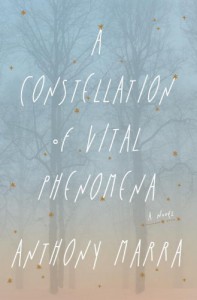 I give this one a 4.75, which I realize wouldn't even work on a 10 star scale. I thought the book was exceptionally well written and plotted out, with great prose. It felt like you were right there with the characters, trying to survive alongside them in a war torn corner of the world. The story was good throughout and the ending was satisfying as well. The reason I'm deducting 0.25 stars is because of the epiloguish way some of the fates of the characters are revealed. It was done in a very subtle way throughout the book, and not in a big section titled "Epilogue" at the end of the book, so at least that was good, but I usually like to be left wondering about how the lives of some the characters turn out. That's usually how a book will stick with me.
I give this one a 4.75, which I realize wouldn't even work on a 10 star scale. I thought the book was exceptionally well written and plotted out, with great prose. It felt like you were right there with the characters, trying to survive alongside them in a war torn corner of the world. The story was good throughout and the ending was satisfying as well. The reason I'm deducting 0.25 stars is because of the epiloguish way some of the fates of the characters are revealed. It was done in a very subtle way throughout the book, and not in a big section titled "Epilogue" at the end of the book, so at least that was good, but I usually like to be left wondering about how the lives of some the characters turn out. That's usually how a book will stick with me.Anyway, a great debut novel, and I'll make sure to read his follow-up, whenever he gets around to writing it.
Tenth of December: Stories
 This was my first reading of Saunders. I think I had first seen his name in something having to do with Adam Levin. I think Saunders teaches at Syracuse and Levin was his student at one point? This book then starting popping up on Goodreads ads and in my Recommendations page. Anyway, I decided to read it, and am glad that I did. Upon rating each story individually, and then taking an average, I came out with 4.7 stars. I enjoyed all of the stories, and there wasn't one that I rated a 3. Although some of them involved slightly surreal characters in slightly postmodernist settings (which I liked, and thought was done well), all of the characters seemed to share similar characteristics, in the sense that they were all in some way downtrodden, unfortunate, struggling people (socially, physically, intellectually or financially) working through crappy situations. Among many other things, the book seemed to highlight for me the disconnect people sometimes seem to have with themselves, in the way they perceive the world versus how it really is, and the disconnect we often have with those around us, due to just how abysmally we interact and communicate with each other. All in all, a great collection of stories, and I've already added another one of his books to my "to-read" shelf.
This was my first reading of Saunders. I think I had first seen his name in something having to do with Adam Levin. I think Saunders teaches at Syracuse and Levin was his student at one point? This book then starting popping up on Goodreads ads and in my Recommendations page. Anyway, I decided to read it, and am glad that I did. Upon rating each story individually, and then taking an average, I came out with 4.7 stars. I enjoyed all of the stories, and there wasn't one that I rated a 3. Although some of them involved slightly surreal characters in slightly postmodernist settings (which I liked, and thought was done well), all of the characters seemed to share similar characteristics, in the sense that they were all in some way downtrodden, unfortunate, struggling people (socially, physically, intellectually or financially) working through crappy situations. Among many other things, the book seemed to highlight for me the disconnect people sometimes seem to have with themselves, in the way they perceive the world versus how it really is, and the disconnect we often have with those around us, due to just how abysmally we interact and communicate with each other. All in all, a great collection of stories, and I've already added another one of his books to my "to-read" shelf.
Blood Meridian, or The Evening Redness in the West
 My first two impressions of this book were that the writing is wonderful (in spite of the almost complete dearth of commas), and that the book contains either depictions of violence (like, really violent violence, the savagey wild-west slaughter-the-Indians type) or lengthy descriptions of the expansive western scenery. There doesn't seem to be much more at first glance. I thought maybe it was just me, but perusing other views and interpretations after the fact, I did come across literary critic Steven Shapiro, who described McCarthy as being "obsessed with open space and language", so score a point for me, I guess.
My first two impressions of this book were that the writing is wonderful (in spite of the almost complete dearth of commas), and that the book contains either depictions of violence (like, really violent violence, the savagey wild-west slaughter-the-Indians type) or lengthy descriptions of the expansive western scenery. There doesn't seem to be much more at first glance. I thought maybe it was just me, but perusing other views and interpretations after the fact, I did come across literary critic Steven Shapiro, who described McCarthy as being "obsessed with open space and language", so score a point for me, I guess.As for the ending, I really really liked the way it was done, keeping the climactic scene hidden from the viewer, and leaving it to interpretation. Although many people interpret this scene as one of simple violence, I tend to agree with critic Patrick Shaw's assessment, as I had the same thought that he had prior to even reading his statement. Taking the previous scene, which I thought showed the kid’s inability to perform with a prostitute, and the climactic scene, with the townspeople's shock and amazement upon looking in the outhouse (simple violence was never met with this reaction in the book as far as I remember), I would have to agree that there is more to that scene than just violence. I know that sounds cryptic, as I don't want to spoil anything, but if you read the book, you'll see what I mean, hopefully.
As for the point of this novel, I'm not sure there was one, other than to expose man’s violent nature and how we sometimes become anesthetized to it. It was a good book, but nothing spectacular, in my opinion.
Dog Soldiers
 Although I enjoyed the book, I assume that the people who awarded it the National Book Award and the others who put it on Time's Top 100 List, were already adults during the period of time that the book takes place. I'm sure that because of this, the book that apparently "perfectly captured the underground mood of America in the 1970's" resonated with them much more than it did with me (who wasn't yet born at the time). However, reading about people of originally questionable character that then proceed to spiral into moral degeneracy, and the prevailing themes of greed and violence, are of course relevant and exciting, and I don't mean to say that the story didn't reach me at all. The actual story and its ending were good, and maybe I should give this 4 stars, but as far as drug-riddled books go, I find myself rating in comparison to "Infinite Jest", which probably is just completely unfair, but since Goodreads prevents me from going 3 and half, I'm sticking with 3 unless the book happens to stay with me into next week, at which point I'll bump it up one. Although I don't expect this to happen.
Although I enjoyed the book, I assume that the people who awarded it the National Book Award and the others who put it on Time's Top 100 List, were already adults during the period of time that the book takes place. I'm sure that because of this, the book that apparently "perfectly captured the underground mood of America in the 1970's" resonated with them much more than it did with me (who wasn't yet born at the time). However, reading about people of originally questionable character that then proceed to spiral into moral degeneracy, and the prevailing themes of greed and violence, are of course relevant and exciting, and I don't mean to say that the story didn't reach me at all. The actual story and its ending were good, and maybe I should give this 4 stars, but as far as drug-riddled books go, I find myself rating in comparison to "Infinite Jest", which probably is just completely unfair, but since Goodreads prevents me from going 3 and half, I'm sticking with 3 unless the book happens to stay with me into next week, at which point I'll bump it up one. Although I don't expect this to happen.
Round House, The: A Novel
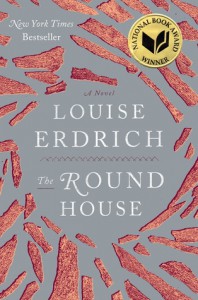 A solid book throughout. A great start gives way to a great middle, which leads to a great ending. A violent act leaves a family emotionally shattered, struggling to find direction and cohesion amidst a haunting desire for justice an vengeance. A young man is abruptly made to handle these complex ideas, giving way to a conclusion which makes you ask the question of whether anything, even perfect justice, can put things back to the way they once were. A very well written book. I certainly wouldn't argue against this winning the National Book Award.
A solid book throughout. A great start gives way to a great middle, which leads to a great ending. A violent act leaves a family emotionally shattered, struggling to find direction and cohesion amidst a haunting desire for justice an vengeance. A young man is abruptly made to handle these complex ideas, giving way to a conclusion which makes you ask the question of whether anything, even perfect justice, can put things back to the way they once were. A very well written book. I certainly wouldn't argue against this winning the National Book Award.
The Dinner
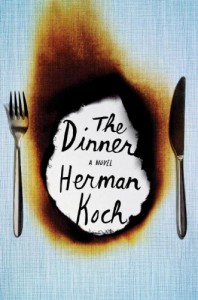 A good, quick, and easy read. Probably a 3.5, but rounding up for its departure from using typical commercial fiction elements, such as having a likable character that you can relate to. There was not one single character in this book that was good or admirable, but who says you need one of those to make an interesting story? I felt that the plot was well laid out, the writing was acceptable, and the book held my interest throughout.
A good, quick, and easy read. Probably a 3.5, but rounding up for its departure from using typical commercial fiction elements, such as having a likable character that you can relate to. There was not one single character in this book that was good or admirable, but who says you need one of those to make an interesting story? I felt that the plot was well laid out, the writing was acceptable, and the book held my interest throughout.This is the second novel in a row that I've read now where the child of the main character has done something horribly, and purposely, reprehensible. It makes you a little uneasy because you think about what you would do in that situation, or at least what you would like to think that you would do. I'd certainly like to think I wouldn't act like these morally bankrupt characters, who seem oblivious to the fact that their thoughts on capital punishment, eugenics, and society's "assholes" completely work against them and their children.
The one thing that really had me scratching my head, however, was the section about the mother's hospitalization, which was devoid of details, and gave us no conclusion as to what happened with regards to her obviously miraculous recovery. It seemed like a long way to go just to highlight their son's unfeeling, uncaring attitude. It felt out of place to me.
As for the ending, it was good, but nothing spectacular. Gone Girl has it beat easily. I would still recommend this to read, though, if you're looking for something fun, quick and easy.
American Pastoral
 Reading some of the reviews on this book, I see a bunch of people saying that the book dragged in certain parts, but I never once felt this way. I really really enjoy reading Philip Roth. The way he brings his complex characters to life, and the way he's able to implement so many themes into a book, makes his books continually interesting. This novel touched on nature vs. nurture, capitalism vs. socialism, the "good ol' days" vs. today, and being an accommodationist vs. being a straight shooter. All of this is wrapped into a story line of a family, headed by a guy that always felt he was trying to do the right thing for his wife and child, ending up with a daughter entrenched in violent fanaticism and a wife pushed to utter despair. Basically, we see that no matter how good you try to be, and how much you try to protect against it, chaos is always lurking around the corner. The question is just how are you going to deal with it when it inevitably arrives?
Reading some of the reviews on this book, I see a bunch of people saying that the book dragged in certain parts, but I never once felt this way. I really really enjoy reading Philip Roth. The way he brings his complex characters to life, and the way he's able to implement so many themes into a book, makes his books continually interesting. This novel touched on nature vs. nurture, capitalism vs. socialism, the "good ol' days" vs. today, and being an accommodationist vs. being a straight shooter. All of this is wrapped into a story line of a family, headed by a guy that always felt he was trying to do the right thing for his wife and child, ending up with a daughter entrenched in violent fanaticism and a wife pushed to utter despair. Basically, we see that no matter how good you try to be, and how much you try to protect against it, chaos is always lurking around the corner. The question is just how are you going to deal with it when it inevitably arrives?
Girl with Curious Hair
 I find myself dropped in the middle of a large stream or a small river, the size of said waterway not so much the issue as is the current, which if to be described in a word, adjectives involving speed not being completely relevant, and being abandoned in favor of the word 'consistent'. I'm in this water and find myself being carried with unyielding consistency towards something, but I'm not sure what. Maybe it's the ocean, with its accompanying feelings of uncertainty and dread and overwhelming force, or maybe it's a relatively stagnant lake, albeit one with some kind of surreal algae bloom that's both interesting and oddly disconcerting at the same time. Maybe it's bringing me right to the brink of a waterfall, where I'll end up unsupported and falling, or maybe I'm unwittingly in a lazy river in a well disguised water park, and I'll end up right back where I started. Regardless of where I'm headed, however, the water is exactly 98.6 degrees, and I don't feel 'immersed in' as much as I feel 'a part of' the current, and I just let myself be carried along comfortably to wherever the river or stream decides to take me, with all destinations being not only equally acceptable, but desired.
I find myself dropped in the middle of a large stream or a small river, the size of said waterway not so much the issue as is the current, which if to be described in a word, adjectives involving speed not being completely relevant, and being abandoned in favor of the word 'consistent'. I'm in this water and find myself being carried with unyielding consistency towards something, but I'm not sure what. Maybe it's the ocean, with its accompanying feelings of uncertainty and dread and overwhelming force, or maybe it's a relatively stagnant lake, albeit one with some kind of surreal algae bloom that's both interesting and oddly disconcerting at the same time. Maybe it's bringing me right to the brink of a waterfall, where I'll end up unsupported and falling, or maybe I'm unwittingly in a lazy river in a well disguised water park, and I'll end up right back where I started. Regardless of where I'm headed, however, the water is exactly 98.6 degrees, and I don't feel 'immersed in' as much as I feel 'a part of' the current, and I just let myself be carried along comfortably to wherever the river or stream decides to take me, with all destinations being not only equally acceptable, but desired. That's kind of how I feel when I read DFW.
Anyway, I enjoyed pretty much all of the short stories here, even the last one which was more of a novella, and which I enjoyed despite knowing that there was much more to the story than I had facilities to grasp. This sent me to the Howling Fantods website, which led me to a two-part analysis of the novella, which in turn directed me to a few pages from a book appropriately titled "Understand David Foster Wallace", which was almost as good as the novella itself and really blew the story wide open for me, on many levels. I learned that much of the story has to do with a metafictional critique on metafiction, and is very closely tied to John Barth’s "Lost in the Funhouse", which I am now looking forward to read in order to understand the novella and DFW even further.
Man, this is fun.
The Twenty-Seventh City (Bestselling Backlist)
 I think it's a good thing that of Franzen's novels, I read this one last. If I had read it first, I may not have bothered to read the rest, which would be a shame, since The Corrections and Freedom were exceptional books, and 5-star material, in my eyes. It's not that I didn't enjoy this book, but with the large cast of characters, it took a good 200-250 pages to get into it enough, and then from there on is was good, but nothing spectacular, and certainly nothing that would make me jump at the chance to read him again. The corruption of the city, the corruption of the individual, and the public's apathy to it all were all very interesting, and relevant to today's world, and the plot was OK, but when comparing this book to his later works of brilliance, it just isn't in the same discussion.
I think it's a good thing that of Franzen's novels, I read this one last. If I had read it first, I may not have bothered to read the rest, which would be a shame, since The Corrections and Freedom were exceptional books, and 5-star material, in my eyes. It's not that I didn't enjoy this book, but with the large cast of characters, it took a good 200-250 pages to get into it enough, and then from there on is was good, but nothing spectacular, and certainly nothing that would make me jump at the chance to read him again. The corruption of the city, the corruption of the individual, and the public's apathy to it all were all very interesting, and relevant to today's world, and the plot was OK, but when comparing this book to his later works of brilliance, it just isn't in the same discussion.
The Love Song of Jonny Valentine: A Novel
 I really enjoyed Kapitoil, so I was looking forward to reading Teddy Wayne's follow-up, even though the title seemed a bit cringey to me. The book did not disappoint, and placed well developed characters in a modern, believable plot. There were times when I felt for the famous young Jonny, or his mother/manager Jane, and then there were times when they did stuff that made me want to write them off because of their superficiality, and because they seemed to put being famous before all else. Their interactions with others, with each other, and with themselves drew out conflicts and doubts, leaving you unsure if you liked or disliked the characters, but at the same time making you think hard and carefully about it, because you're wondering what you would be doing if you were in a situation like Johnny or Jane, or even Al for that matter. I would have preferred the conclusion of the book to be a little more open ended, but it didn't take away anything from what I thought of the book. A solid read, and I'll be looking forward to Teddy Wayne's next book. Since so far he's written in the voice of a socially disadvantaged foreigner and a famous little boy, which at points almost sounded a bit similar, I'll be hoping the next novel is written in the voice of someone sounding completely different. Jonny had good vocal range. Let's see what kind of literary range Teddy has.
I really enjoyed Kapitoil, so I was looking forward to reading Teddy Wayne's follow-up, even though the title seemed a bit cringey to me. The book did not disappoint, and placed well developed characters in a modern, believable plot. There were times when I felt for the famous young Jonny, or his mother/manager Jane, and then there were times when they did stuff that made me want to write them off because of their superficiality, and because they seemed to put being famous before all else. Their interactions with others, with each other, and with themselves drew out conflicts and doubts, leaving you unsure if you liked or disliked the characters, but at the same time making you think hard and carefully about it, because you're wondering what you would be doing if you were in a situation like Johnny or Jane, or even Al for that matter. I would have preferred the conclusion of the book to be a little more open ended, but it didn't take away anything from what I thought of the book. A solid read, and I'll be looking forward to Teddy Wayne's next book. Since so far he's written in the voice of a socially disadvantaged foreigner and a famous little boy, which at points almost sounded a bit similar, I'll be hoping the next novel is written in the voice of someone sounding completely different. Jonny had good vocal range. Let's see what kind of literary range Teddy has.
Falconer
 This was on Time's Top 100 List? I'm not sure I see why. It's not that the book wasn't good, it just wasn't great. Farragut seemed to be a drug addicted hollowed out soul going through the motions of surviving in prison, and nothing more, which was probably the point, but I felt both a lack of character depth and a plot, and I at least like to have one of those in a book. Aside from these flaws, it was still a book that kept my attention throughout, and I did like the writing, so I wouldn't say it was a waste of my time. It's just not a book that will stay with me for very long.
This was on Time's Top 100 List? I'm not sure I see why. It's not that the book wasn't good, it just wasn't great. Farragut seemed to be a drug addicted hollowed out soul going through the motions of surviving in prison, and nothing more, which was probably the point, but I felt both a lack of character depth and a plot, and I at least like to have one of those in a book. Aside from these flaws, it was still a book that kept my attention throughout, and I did like the writing, so I wouldn't say it was a waste of my time. It's just not a book that will stay with me for very long.
Ms. Hempel Chronicles
 I really enjoyed this one. Related short stories about a young 7th grade teacher who became one because it was the easy thing to do, tries hard at times but at others just takes the shortcuts, and is attached to her students, sometimes oddly so, while hoping that she's had some kind of positive effect on them. At the same time, we see some of her past, her family, and her relationships with men and her colleagues. An unsure imperfect teacher with a real life and and real problems like the rest of us, trying to make it through with a hope that in the end we've somehow accomplished something worthwhile.
I really enjoyed this one. Related short stories about a young 7th grade teacher who became one because it was the easy thing to do, tries hard at times but at others just takes the shortcuts, and is attached to her students, sometimes oddly so, while hoping that she's had some kind of positive effect on them. At the same time, we see some of her past, her family, and her relationships with men and her colleagues. An unsure imperfect teacher with a real life and and real problems like the rest of us, trying to make it through with a hope that in the end we've somehow accomplished something worthwhile.Very well written. A pleasure to read.
About a Boy
 Probably more of a 3.5, but I'm rounding up in this instance.
Probably more of a 3.5, but I'm rounding up in this instance.A fun, quick read about kids with separated parents trying to find their way and figure out who they are, and the adults in their lives who are just as much trying to do the same. Through the dysfunction, they're able to offer each other help along the way. I appreciated the author's descriptions of life as it is, and not how it should be. I found this book similar to some Tom Perrotta books, which is a good thing, although I find Perrotta more rewarding to read.
Life of Pi
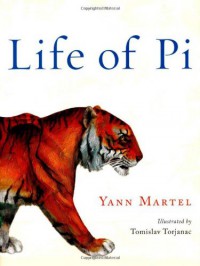 A book has started off on the wrong foot for me when 20 pages in, it tells me that it is "indeed, a story to make you believe in God".
A book has started off on the wrong foot for me when 20 pages in, it tells me that it is "indeed, a story to make you believe in God".The next 50 pages were no less irritating, as the narrator attempts to laud the idea of zoos, arguing that animals have more freedom being confined to a zoo, and saying that if animals "could choose with intelligence, it would opt for living in a zoo". This is a baseless argument, as animals can't choose with intelligence, as they are wild animals evolved to live...in the wild. He then offers the equally flimsy argument, posed as a question: "Would you rather be put up at the Ritz with free room service and unlimited access to a doctor or be homeless without a soul to care for you?" Well, when you frame it like that, sure, I choose the Ritz. But how about if the question is posed like this... "Would you rather be put up at the Ritz with free room service and unlimited access to a doctor, and never, ever be allowed to step foot out of the Ritz until the day you die, or would you rather take your chances living a life on your own outside of the Ritz, and go where you please?" Now, the answer is probably different. Fifty pages of shoddy philosophy, riddled with logical fallacies, and all for the purpose of making an analogy between religion and zoos. Now, I agree that the two are similar, but for the completely opposite reasons the narrator does.
At this point, I was ready with a 1-star review.
Then came the main bulk of the story. It was entertaining, although at points it tended to lag. A story of survival on the open seas, with the main character using instinct, reason, and ingenuity to stay alive on lifeboat with a tiger. A little far-fetched, but a touch of magical realism never hurt anybody, so hey, why not.
At this point, I agreed that the 1-star might have been jumping the gun a little, and I was ready to bump it up to a 2-star review.
Then came the end of the book. I can't say much without giving anything away, so I'll just say that the end was solid, and pulled the book up easily to 3 stars, if not 3.5.
So, did the book make me believe in God? Not in the slightest. In fact, as my brother said it would, it actually reaffirmed my worldview with respect to religion. I'm not sure that's the interpretation the author was hoping for out of the reader, but that's what I got out of it. That, and a fun story.
 1
1
